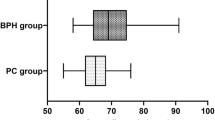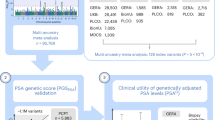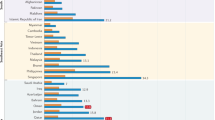Abstract
Several pathologies affect human prostate, such as prostate cancer (PC), which is the most common non-skin malignant cancer in Western male populations. A complex interaction between genetic and environmental factors (i.e. infectious agents, dietary carcinogens) and hormonal imbalances has been reported to have a fundamental role in PC pathophysiology by evoking chronic inflammation. Thus, chronic inflammation drives prostate carcinogenesis and neoplastic progression. No adequate biomarkers exist until now to guide PC prognosis and treatment. Accordingly, the research has particularly focused its attention on genetic variants in genes, codifying molecules of signaling innate immune/inflammatory and steroid metabolism pathways, which are able to modify the PC genetic susceptibility and clinical disease outcome. Single-nucleotide polymorphisms (SNPs) may operate in combination to create a ‘risk profile’. Combinations of several inflammatory and sex steroid hormone pathway SNPs are found in PC patients. Thus, their combinations might be used as promising biomarkers in a pre- and post-treatment clinical PC setting. Indeed, their identification may hold promise for the realization of a personalized PC medicine. Many of these aspects are summarized in this report through the elucidation of literature data and the results of our studies.
This is a preview of subscription content, access via your institution
Access options
Subscribe to this journal
Receive 12 print issues and online access
$259.00 per year
only $21.58 per issue
Buy this article
- Purchase on Springer Link
- Instant access to full article PDF
Prices may be subject to local taxes which are calculated during checkout


Similar content being viewed by others
References
Lin BK, Clyne M, Walsh M, Gomez O, Yu W, Gwinn M et al. Tracking the epidemiology of human genes in the literature: the HuGE Published Literature database. Am J Epidemiol 2006; 164: 1–4.
Jemal A, Bray F, Center MM, Ferlay J, Ward E, Forman D. . Global cancer statistics. CA Cancer J Clin 2011; 61: 69–90.
Arcangeli S, Pinzi V, Arcangeli G. . Epidemiology of prostate cancer and treatment remarks. World J Radiol 2012; 4: 241–246.
Ferlay J, Parkin DM, Steliarova-Foucher E. . Estimates of cancer incidence and mortality in Europe in 2008. Eur J Cancer 2008; 46: 765–781.
Sardana G, Dowell B, Diamandis EP. . Emerging biomarkers for the diagnosis and prognosis of prostate cancer. Clin Chem 2008; 54: 1951–1960.
Barry MJ. . Screening for prostate cancer—the controversy that refuses to die. N Engl J Med 2009; 360: 1351–1354.
Caruso C, Balistreri CR, Candore G, Carruba G, Colonna-Romano G, Di Bona D et al. Polymorphisms of pro-inflammatory genes and prostate cancer risk: a pharmacogenomic approach. Cancer Immunol Immunother 2009; 58: 1919–1933.
Dong LM, Potter JD, White E, Ulrich CM, Cardon LR, Peters U . Genetic susceptibility to cancer: the role of polymorphisms in candidate genes. JAMA 2008; 299: 2423–2436.
Foulkes WD . Inherited susceptibility to common cancers. N Engl J Med 2008; 359: 2143–2153.
Mantovani A, Allavena P, Sica A, Balkwill F . Cancer-related inflammation. Nature 2008; 454: 436–444.
Schreiber RD, Old LJ, Smyth MJ. . Cancer immunoediting: integrating immunity's roles in cancer suppression and promotion. Science 2011; 33: 1565–1550.
Vesely MD, Kershaw MH, Schreiber RD, Smyth MJ. . Natural innate and adaptive immunity to cancer. Annu Rev Immunol 2011; 29: 235–271.
Sethi G, Shanmugam MK, Ramachandran L, Kumar AP, Tergaonkar V. . Multifaceted link between cancer and inflammation. Biosci Rep 2012; 32: 1–15.
Porta C, Larghi P, Rimoldi M, Totaro MG, Allavena P, Mantovani A . Cellular and molecular pathways linking inflammation and cancer. Immunobiology 2009; 214: 761–777.
Ancrile BB, O'Hayer KM, Counter CM. . Oncogenic ras-induced expression of cytokines: a new target of anti-cancer therapeutics. Mol Interv 2008; 8: 22–27.
Abe W, Nasu K, Nakada C, Kawano Y, Moriyama M, Narahara H. . miR-196b targets c-myc and Bcl-2 expression, inhibits proliferation and induces apoptosis in endometriotic stromal cells. Hum Reprod 2013; 28: 750–761.
Balistreri CR, Candore G, Accardi G, Colonna-Romano G, Lio D. . NF-kappaB pathway activators as potential ageing biomarkers: targets for new therapeutic strategies. Immun Ageing 2013; 10: 24.
Lin Y, Bai L, Chen W, Xu S. . The NF-kappaB activation pathways, emerging molecular targets for cancer prevention and therapy. Expert Opin Ther Targets 2010; 14: 45–55.
De Marzo AM, Platz EA, Sutcliffe S, Xu J, Grönberg H, Drake CG et al. Inflammation in prostate carcinogenesis. Nat Rev Cancer 2007; 7: 256–269.
Sfanos KS, De Marzo AM . Prostate cancer and inflammation: the evidence. Histopathology 2012; 60: 199–215.
Wang W, Bergh A, Damber J-E . Morphological transition of proliferative inflammatory atrophy to high-grade intraepithelial neoplasia and cancer in human prostate. Prostate 2009; 69: 1378–1386.
Jiang B, Mason J, Jewett A, Liu ML, Chen W, Qian J et al. Tumor-infiltrating immune cells: triggers for tumor capsule disruption and tumor progression? Int J Med Sci 2013; 10: 475–497.
Miller AM, Lundberg K, Ozenci V, Banham AH, Hellström M, Egevad L et al. CD4+CD25high T cells are enriched in the tumor and peripheral blood of prostate cancer patients. J. Immunol 2006; 177: 7398–7405.
Oblak A, Jerala R . Toll-like receptor 4 activation in cancer progression and therapy. Clin Dev Immunol 2011; 2011: 609579.
Martin F, Apetoh L, Ghiringhelli F . Controversies on the role of Th17 in cancer: a TGF-β-dependent immunosuppressive activity? Trends Mol Med 2012; 18: 742–749.
Zhang K, Zhou B, Wang Y, Rao L, Zhang L . The TLR4 gene polymorphisms and susceptibility to cancer: a systematic review and meta-analysis. Eur J Cancer 2013; 49: 946–954.
Naugler WE, Sakurai T, Kim S, Maeda S, Kim K, Elsharkawy AM et al. Gender disparity in liver cancer due to sex differences in MyD88-dependent IL-6 production. Science 2007; 317: 121–124.
Gunter C . Genomics: a picture worth 1000 Genomes. Nat Rev Genet 2010; 11: 814.
Marian AJ . Molecular genetic studies of complex phenotypes. Transl Res 2012; 159: 64–79.
Nadeau JH . Modifier genes in mice and humans. Nat Rev Genet 2001; 2: 165–174.
Nadeau JH. . Modifier genes and protective alleles in humans and mice. Curr Opin Genet Dev 2003; 13: 290–295.
Demaria S, Pikarsky E, Karin M, Coussens LM, Chen YC, El-Omar EM et al. Cancer and inflammation: promise for biologic therapy. J Immunother 2010; 33: 335–351.
Licastro F, Bertaccini A, Porcellini E, Chiappelli M, Pernetti R, Sanguedolce F et al. Alpha 1 antichymotrypsin genotype is associated with increased risk of prostate carcinoma and PSA levels. Anticancer Res 2008; 28: 395–399.
Tindall EA, Severi G, Hoang HN, Ma CS, Fernandez P, Southey MC et al. Australian Prostate Cancer BioResource. Comprehensive analysis of the cytokine-rich chromosome 5q31.1 region suggests a role for IL-4 gene variants in prostate cancer risk. Carcinogenesis 2010; 31: 1748–1754.
Zabaleta J, Su LJ, Lin HY, Sierra RA, Hall MC, Sartor AO et al. Cytokine genetic polymorphisms and prostate cancer aggressiveness. Carcinogenesis 2009; 30: 1358–1362.
Kwon EM, Salinas CA, Kolb S, Fu R, Feng Z, Stanford JL et al. Genetic polymorphisms in inflammation pathway genes and prostate cancer risk. Cancer Epidemiol Biomarkers Prev 2011; 20: 923–933.
Yang X, Li B, Si T, Liu Y, Guo Z . Association between the 8473T>C polymorphism of PTGS2 and prostate cancer risk: a metaanalysis including 24,716 subjects. Onkologie 2013; 36: 182–186.
Zheng SL, Augustsson-Bälter K, Chang B, Hedelin M, Li L, Adami HO et al. Sequence variants of toll-like receptor 4 are associated with prostate cancer risk: results from the CAncer Prostate in Sweden Study. Cancer Res 2004; 64: 2918–2922.
Chen YC, Giovannucci E, Lazarus R, Kraft P, Ketkar S, Hunter DJ . Sequence variants of Toll-like receptor 4 and susceptibility to prostate cancer. Cancer Res 2005; 65: 11771–11778.
Cheng I, Plummer SJ, Casey G, Witte JS . Toll-like receptor 4 genetic variation and advanced prostate cancer risk. Cancer Epidemiol Biomarkers Prev 2007; 16: 352–355.
Balistreri CR, Caruso C, Carruba G, Miceli V, Campisi I, Listì F et al. A pilot study on prostate cancer risk and pro-inflammatory genotypes: pathophysiology and therapeutic implications. Curr Pharm Des 2010; 16: 718–724.
Balistreri CR, Caruso C, Listì F, Colonna-Romano G, Lio D, Candore G . LPS-mediated production of pro/anti-inflammatory cytokines and eicosanoids in whole blood samples: biological effects of +896A/G TLR4 polymorphism in a Sicilian population of healthy subjects. Mech Ageing Dev 2011; 132: 86–92.
Mason TE, Ricks-Santi L, Chen W, Apprey V, Joykutty J, Ahaghotu C et al. Association of CD14 variant with prostate cancer in African American men. Prostate 2010; 70: 262–269.
Zhang P, Wei Q, Li X, Wang K, Zeng H, Bu H et al. A functional insertion/deletion polymorphism in the promoter region of the NFKB1 gene increases susceptibility for prostate cancer. Cancer Genet Cytogenet 2009; 191: 73–77.
Zheng SL, Liu W, Wiklund F, Dimitrov L, Bälter K, Sun J et al. A comprehensive association study for genes in inflammation pathway provides support for their roles in prostate cancer risk in the CAPS study. Prostate 2006; 66: 1556–1564.
Ricke WA, Wang Y, Cunha GR . Steroid hormones and carcinogenesis of the prostate: the role of estrogens. Differentiation 2007; 75: 871–882.
Ellem SJ, Risbridger GP . The dual, opposing roles of estrogen in the prostate. Ann N Y Acad Sci 2009; 1155: 174–186.
Ellem SJ, Risbridger GP . Aromatase and regulating the estrogen: androgen ratio in the prostate gland. J Steroid Biochem Mol Biol 2010; 118: 246–251.
Carruba G . Estrogen and prostate cancer: an eclipsed truth in an androgen-dominated scenario. J Cell Biochem 2007; 102: 899–911.
McPherson SJ, Ellem SJ, Risbridger GP . Estrogen-regulated development and differentiation of the prostate. Differentiation 2008; 76: 660–670.
Ellem SJ, Wang H, Poutanen M, Risbridger GP . Increased endogenous estrogen synthesis leads to the sequential induction of prostatic inflammation (prostatitis) and prostatic pre-malignancy. Am J Pathol 2009; 175: 1187–1199.
Crawford ED . Understanding the epidemiology, natural history, and key pathways involved in prostate cancer. Urology 2009; 73: S4–S10.
Platz EA, Giovannucci E . The epidemiology of sex steroid hormones and their signaling and metabolic pathways in the etiology of prostate cancer. J Steroid Biochem Mol Biol 2004; 92: 237–253.
Cussenot O, Azzouzi AR, Nicolaiew N, Fromont G, Mangin P, Cormier L et al. Combination of polymorphisms from genes related to estrogen metabolism and risk of prostate cancers: the hidden face of estrogens. J Clin Oncol 2007; 25: 3596–3602.
Chae YK, Huang HY, Strickland P, Hoffman SC, Helzlsouer K . Genetic polymorphisms of estrogen receptors alpha and beta and the risk of developing prostate cancer. PLoS One 2009; 4: e6523.
Dianat SS, Margreiter M, Eckersberger E, Finkelstein J, Kuehas F, Herwig R et al. Gene polymorphisms and prostate cancer: the evidence. BJU Int 2009; 104: 1560–1572.
Mononen N, Schleutker J . Polymorphisms in genes involved in androgen pathways as risk factors for prostate cancer. J Urol 2009; 181: 1541–1549.
Huhtaniemi IT, Pye SR, Holliday KL, Thomson W, O’Neill TW, Platt H et alEuropean Male Aging Study Group. Effect of polymorphisms in selected genes involved in pituitary–testicular function on reproductive hormones and phenotype in aging men. J Clin Endocrinol Metab 2010; 95: 1898–1908.
Balistreri CR, Caruso C, Carruba G, Miceli V, Candore G . Genotyping of sex hormone-related pathways in benign and malignant human prostate tissues: data of a preliminary study. OMICS 2011; 15: 369–374.
Balistreri CR, Candore G, Accardi G, Bova M, Buffa S, Bulati M et al. Genetics of longevity. Data from the studies on Sicilian centenarians. Immun Ageing 2012; 9: 8.
Balistreri CR, Colonna-Romano G, Lio D, Candore G, Caruso C. . TLR4 polymorphisms and ageing: implications for the pathophysiology of age-related diseases. J Clin Immunol 2009; 29: 406–415.
Kote-Jarai Z, Olama AA, Giles GG, Severi G, Schleutker J, Weischer M et alUK Genetic Prostate Cancer Study Collaborators/British Association of Urological Surgeons' Section of Oncology; UK ProtecT Study Collaborators, The Australian Prostate Cancer BioResource; PRACTICAL Consortium. Seven prostate cancer susceptibility loci identified by a multi-stage genome-wide association study. Nat Genet 2011; 43: 785–791.
Gordanpour A, Nam RK, Sugar L, Seth A . MicroRNAs in prostate cancer: from biomarkers to molecularly-based therapeutics. Prostate Cancer Prostatic Dis 2012; 15: 314–319.
Yu JJ, Xia SJ . Novel role of microRNAs in prostate cancer. Chin Med J (Engl) 2013; 126: 2960–2964.
Sita-Lumsden A, Dart DA, Waxman J, Bevan CL . Circulating microRNAs as potential new biomarkers for prostate cancer. Br J Cancer 2013; 108: 1925–1930.
Olivieri F, Rippo MR, Monsurrò V, Salvioli S, Capri M, Procopio AD et al. MicroRNAs linking inflamm-aging, cellular senescence and cancer. Ageing Res Rev 2013; 12 (4): 1056–1068.
Olivieri F, Rippo MR, Procopio AD, Fazioli F . Circulating inflamma-miRs in aging and age-related diseases. Front Genet 2013; 4: 121.
George GP, Gangwar R, Mandal RK, Sankhwar SN, Mittal RD . Genetic variation in microRNA genes and prostate cancer risk in North Indian population. Mol Biol Rep 2011; 38: 1609–1615.
Xu B, Feng NH, Li PC, Tao J, Wu D, Zhang ZD et al. A functional polymorphism in Pre-miR-146a gene is associated with prostate cancer risk and mature miR-146a expression in vivo. Prostate 2010; 70: 467–472.
Caruso C, Passarino G, Puca A, Scapagnini G . ‘Positive biology’: the centenarian lesson. Immun Ageing 2012; 9: 5.
Candore G, Balistreri CR, Caruso M, Grimaldi MP, Incalcaterra E, Listì F et al. Pharmacogenomics: a tool to prevent and cure coronary heart disease. Curr Pharm Des 2007; 13: 3726–3734.
Candore G, Balistreri CR, Grimaldi MP, Listì F, Vasto S, Chiappelli M et al. Polymorphisms of pro-inflammatory genes and Alzheimer's disease risk: a pharmacogenomic approach. Mech Ageing Dev 2007; 128: 67–75.
Chin L, Andersen JN, Futreal PA. . Cancer genomics: from discovery science to personalized medicine. Nat Med 2011; 17: 297–303.
Tran B, Dancey JE, Kamel-Reid S, McPherson JD, Bedard PL, Brown AM et al. Cancer genomics: technology, discovery, and translation. J Clin Oncol 2012; 30: 647–660.
Salinas CA, Koopmeiners JS, Kwon EM, FitzGerald L, Lin DW, Ostrander EA et al. Clinical utility of five genetic variants for predicting prostate cancer risk and mortality. Prostate 2009; 69: 363–372.
Pashayan N, Duffy SW, Chowdhury S, Dent T, Burton H, Neal DE et al. Polygenic susceptibility to prostate and breast cancer: implications for personalised screening. Br J Cancer 2011; 104: 1656–1663.
Rakoff-Nahoum S, Medzhitov R . Regulation of spontaneous intestinal tumorigenesis through the adaptor protein MyD88. Science 2007; 317: 124–127.
Author information
Authors and Affiliations
Corresponding author
Ethics declarations
Competing interests
The authors declare no conflict of interest.
Rights and permissions
About this article
Cite this article
Balistreri, C., Candore, G., Lio, D. et al. Prostate cancer: from the pathophysiologic implications of some genetic risk factors to translation in personalized cancer treatments. Cancer Gene Ther 21, 2–11 (2014). https://doi.org/10.1038/cgt.2013.77
Received:
Revised:
Accepted:
Published:
Issue Date:
DOI: https://doi.org/10.1038/cgt.2013.77
Keywords
This article is cited by
-
Toll-like receptor 4 (TLR4) expression is correlated with T2* iron deposition in response to doxorubicin treatment: cardiotoxicity risk assessment
Scientific Reports (2020)
-
Degradable Polyethylenimine-Based Gene Carriers for Cancer Therapy
Topics in Current Chemistry (2017)
-
DNA damage response and prostate cancer: defects, regulation and therapeutic implications
Oncogene (2015)



